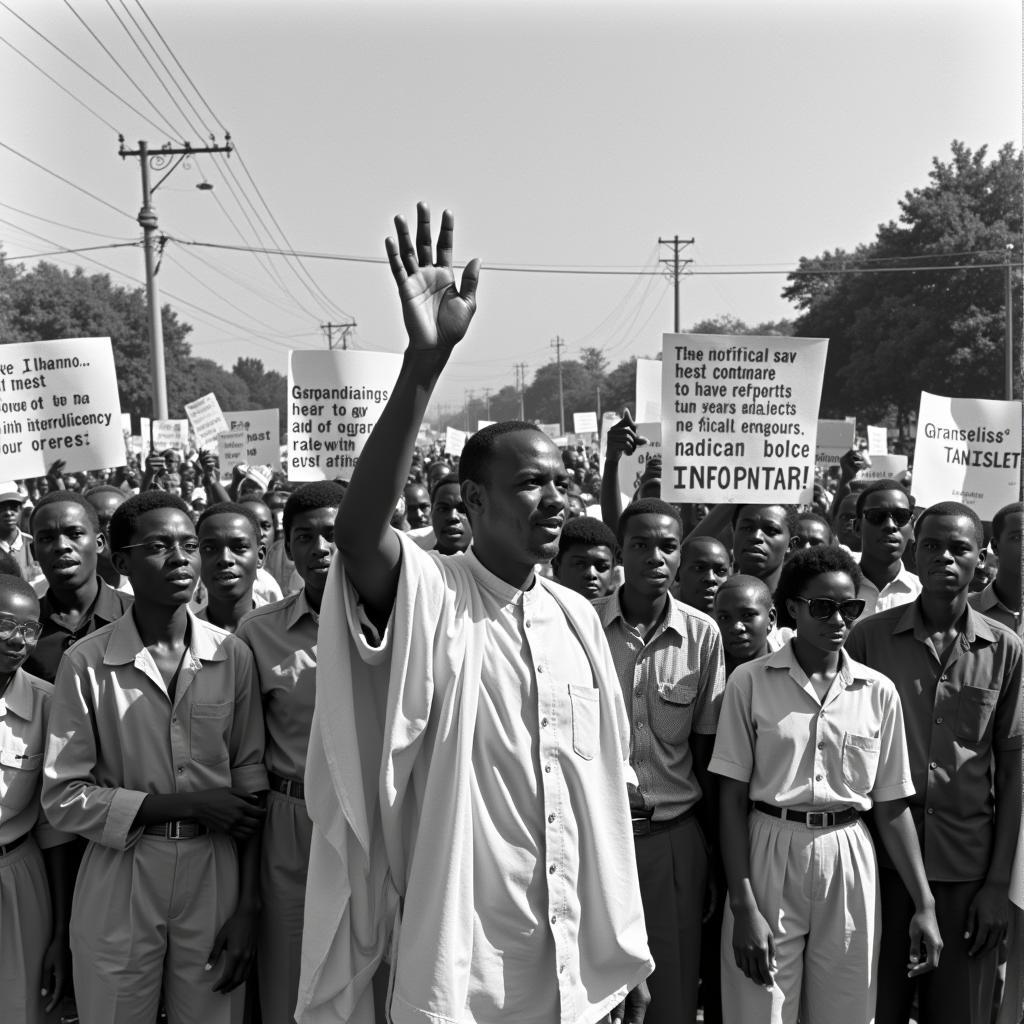African Gandhi: Kwame Nkrumah and the Fight for Ghana’s Freedom
Kwame Nkrumah, often hailed as the “African Gandhi,” led Ghana to independence from British rule in 1957. His blend of peaceful resistance and Pan-Africanist ideals resonated across the continent, inspiring numerous liberation movements and solidifying his place as a pivotal freedom fighter. Nkrumah’s legacy continues to shape African politics and the global understanding of decolonization.
Nkrumah’s Path to Becoming the “African Gandhi”
Nkrumah’s journey began with a deep commitment to education. He pursued studies abroad in the United States and Britain, where he honed his political philosophy and developed his vision for a free and united Africa. His exposure to Gandhi’s principles of nonviolent resistance profoundly influenced his approach to liberation. He saw in Gandhi’s success a model for achieving freedom through peaceful means.
Nkrumah returned to the Gold Coast (present-day Ghana) in 1947, joining the United Gold Coast Convention (UGCC) to advocate for self-government. His charisma and powerful oratory skills quickly propelled him to leadership within the movement. He understood the power of mobilizing the masses and effectively communicated his message of freedom and self-determination.
The Role of Nonviolent Resistance in Ghana’s Independence
Inspired by the African Gandhi Freedom Fighter, Mahatma Gandhi, Nkrumah adopted nonviolent methods of resistance, organizing boycotts, strikes, and peaceful demonstrations. This strategy proved highly effective in putting pressure on the British colonial authorities. While facing imprisonment and repression, Nkrumah and his followers remained steadfast in their commitment to peaceful change. This unwavering adherence to nonviolence resonated deeply with the Ghanaian people and earned Nkrumah the moniker “African Gandhi.”
 Kwame Nkrumah Leading a Peaceful Protest
Kwame Nkrumah Leading a Peaceful Protest
Nkrumah’s Vision: Pan-Africanism and Beyond
Nkrumah’s vision extended beyond Ghana’s independence. He championed Pan-Africanism, advocating for a united and independent Africa free from colonial rule. His leadership in forming the Organization of African Unity (OAU) in 1963 solidified his commitment to this ideal.
Challenges and Controversies in Nkrumah’s Leadership
Despite his significant achievements, Nkrumah’s leadership was not without its challenges. His focus on a unified Africa sometimes clashed with the interests of newly independent nations. His later adoption of socialist policies and a one-party system drew criticism and sparked debate about his legacy.
“Nkrumah’s dedication to Pan-Africanism was unmatched. He saw a future where Africa stood as one, a powerful force on the world stage,” notes Dr. Abena Oduro, a prominent historian specializing in African decolonization.
“While his methods sometimes proved controversial, his ultimate goal was the betterment of Africa and its people,” adds Professor Kofi Asante, a scholar of Nkrumah’s political thought.
The Enduring Legacy of the “African Gandhi”
Kwame Nkrumah, the african gandhi freedom fighter, remains a towering figure in African history. His leadership in Ghana’s independence struggle and his unwavering commitment to Pan-Africanism continue to inspire generations. His legacy as a freedom fighter and visionary leader is complex and multifaceted, prompting ongoing discussions about his impact on Africa and the world.
In conclusion, Kwame Nkrumah, the african gandhi freedom fighter, played a pivotal role in shaping the course of African history. His adoption of nonviolent resistance, inspired by Mahatma Gandhi, led Ghana to independence and ignited a flame of liberation across the continent. His vision of a united Africa remains a powerful ideal, reminding us of the ongoing struggle for true self-determination and the enduring legacy of this remarkable freedom fighter.
FAQ
- Why is Kwame Nkrumah called the “African Gandhi”?
- What were Nkrumah’s key contributions to Pan-Africanism?
- What methods did Nkrumah use to achieve Ghana’s independence?
- What were some of the controversies surrounding Nkrumah’s leadership?
- How did Nkrumah’s time abroad influence his political philosophy?
- What is the lasting impact of Nkrumah’s legacy on Africa?
- What were the key challenges Nkrumah faced after independence?
Other articles you may find interesting: The Rise of Pan-Africanism, The Impact of Colonialism on African Nations, The Future of African Unity.
Call us at +255768904061, email kaka.mag@gmail.com or visit us at Mbarali DC Mawindi, Kangaga, Tanzania for 24/7 support.

